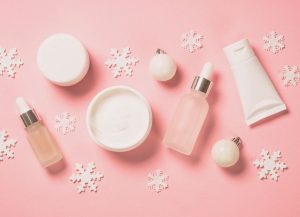As the winter months begin to approach, make sure you do your due diligence in protecting and taking care of your skin. The weather is chillier and because the sun may not be out and as hot as it was in the summer, it surely doesn’t mean you should get relaxed about your skincare regimen.
No matter the season, one should always be indulging in self-care skin care. Skin protectants that include petroleum and creams with ceramides are effective as well. Although it’s nice to experiment during a change in season, let’s be real: cold weather is tough on skin! With that said, check out these six tips to help you protect your skin in the winter.
#1 Wear Sunscreen
If it’s not ingrained in your memory by now, here is a kind reminder to always wear your sunscreen. The sun in the winter season, combined with glare from the snow, can seriously damage your skin. We should be protecting our skin as much as possible, while still allowing it to breathe and receive the nutrients it needs to thrive.
Sunscreen should always be applied to your face and hands (if they’re exposed) about 30 minutes before you go outside. If necessary, you can always reapply as frequently as you need if you stay outside for a period of long time. There’s a stigma surrounding sunscreen that it should only be applied in the summer when you’re going to the pool or beach. Not true!
All skin types will appreciate the wear of sunscreen year-round. When purchasing and wearing sunscreen, you should pick one up with a sun-protection factor of 15 SPF or greater if you plan to be outdoors for prolonged periods. If you’re not sure what’s best for your skin, schedule a consult with a dermatologist to get insight on exactly what your skin needs.
#2 Minimize Hot Showers
Of course, when it’s cold, we want to consume and indulge in everything hot! Some studies have shown that exposing our skin to hot water for long periods of time can harm our skin long term. The hot water strips away our natural oils, leaving our skin unprotected and moisturized.
When possible, use warm or lukewarm water instead, including when you wash your face or hands. After every bath time routine, be sure to apply moisturizer to your skin to support your natural oils in giving you that natural glow.
#3 Drink Water
The underdog of all beverages…WATER! Water is one the most useful resources in achieving thriving, healthy skin. Water is known to keep your body hydrated and refreshed and helps maintain your skin’s elasticity. It has been shared that when you consume water during the colder months, it helps you stay warm as well as provides your body with the support it needs to fight off any infection. A good rule of thumb is 8 glasses of water per day, but your body truly can’t get enough of water, so drink away!
#4 Increase Your Vitamin Intake
To further support your skin in the winter season it’s vital to take your vitamins. Vitamin D is one of the best vitamins for your skin, along with vitamins C, E, and K. Small studies show that swallowing C and E supplements significantly increases the skin’s ability to stand up to the sun’s ultraviolet (UV) rays. As a wonderful reminder, vitamin E protects your cell walls and regulates collagen breakdown. Vitamin E works best with helper antioxidants like Vitamin C.
#5 Understand Your Skin
There are a few different skin types that people have. Some may have combination, oily, dry, sensitive, hyper-pigmented and normal. There is no shame in the type you have, but it’s important to do as much homework on it to understand which products may be for you and which ones you should stay clear from.
Skin health is important not only for appearance’s sake, but more importantly because skin performs so many of the body’s essential tasks. Additionally, when a person has healthy skin, they can instantly identify when something’s off due to changes in their skin’s behavior.
#6 Moisturize
There are tons of different moisturizes on the shelves you can decide from. Once you know your skin type, you can find a moisturizer that gives your skin life! If you’re prone to breakouts, you want to stay away from petroleum or oil-based formulas. As an alternate try one that contains lipids instead.
On the other hand, if your skin is severely dry, you may want to try adding an emollient moisturizer that seals in moisture, followed by another moisturizer on top. It is so important to note that just because a moisturizer is thicker in substance doesn’t necessarily mean it’s always better.
Related: 5 Small Skincare Tweaks to Glow All Day
The next time you think about heading outside in the winter, make sure you apply some sunscreen to protect your skin! What are some of the best sunscreens out that have helped the trajectory of your skin’s health? Are there any tips outside of the ones we mentioned you would love to share?
Check us out on social IG @citygirlsavings and follow us on our City Girl Savings meta page to connect with other members of the community. On the go worries tune into our City Girl Savings podcast where our CEO and Founder chats all things finance!






1 thought on “6 Tips to Protect Your Skin in the Winter”
Thank you for an excellent blog. The information you have given is very interesting and helpful. Will definitely bookmark it!